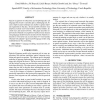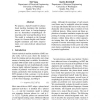78 search results - page 1 / 16 » Neural network based language models for highly inflective l... |
ICASSP
2009
IEEE
13 years 8 months ago
2009
IEEE
Speech recognition of inflectional and morphologically rich languages like Czech is currently quite a challenging task, because simple n-gram techniques are unable to capture impo...
EACL
2006
ACL Anthology
13 years 6 months ago
2006
ACL Anthology
We propose a backoff model for phrasebased machine translation that translates unseen word forms in foreign-language text by hierarchical morphological abstractions at the word an...
INFORMATICALT
2006
13 years 4 months ago
2006
This paper investigates a variety of statistical cache-based language models built upon three corpora: English, Lithuanian, and Lithuanian base forms. The impact of the cache size,...
ANLP
1997
13 years 6 months ago
1997
We present results of probabilistic tagging of Czech texts in order to show how these techniques work for one of the highly morphologically ambiguous inflective languages. After d...
INTERSPEECH
2010
12 years 11 months ago
2010
A new recurrent neural network based language model (RNN LM) with applications to speech recognition is presented. Results indicate that it is possible to obtain around 50% reduct...


